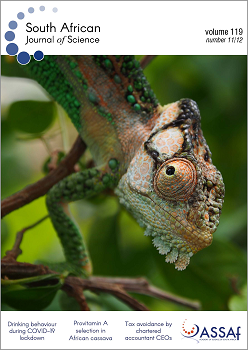Alcohol consumption patterns, suppliers and online alcohol marketing: Before and during COVID-19 alcohol bans
DOI:
https://doi.org/10.17159/sajs.2023/14543Keywords:
substance use, heavy episodic drinking, digital marketing, COVID-19, illegalAbstract
COVID-19-related alcohol sales bans and stay-at-home orders prompted the alcohol industry in South Africa to increase their online alcohol sales promotions. We investigated changes in alcohol-related behaviour and the drivers of illegal alcohol sales through a self-reported Facebook survey that ran from July to November 2020. Questions included socio-demographics and comparison of alcohol purchasing behaviour and intake during 2019 and 2020. Statistical tests were applied to find associations between illegal alcohol purchasing and alcohol-related behaviours. A total of 792 participants took part in the survey, 69.7% of whom were female. During lockdown periods, most participants (55.3%) bought alcohol illegally from illegal outlets or friends. Online alcohol-delivery marketing increased by 20 percentage points from 2019 to 2020, with participants stating that they saw a lot of advertisements per day and 80% of persons under 25 years were not asked to verify their age in 2020 upon delivery. Home-brewed beer and vodka intake increased in 2020 during the alcohol sales bans. Men from the Western Cape who engaged in daily or weekly heavy episodic drinking were more prone to purchase alcohol illegally. The Western Cape, which is South Africa’s most prolific wine-producing region, had the highest odds of people buying alcohol illegally, with wine being found to be the most frequently bought alcohol online and consumed by these participants. There is a need for further research into the differences in alcohol-related behaviour affecting illegal alcohol purchasing according to income group, proximity to alcohol producers and underage alcohol sales and marketing through online applications.
Significance:
- Alcohol sales bans have the potential to reduce and stop the alcohol intake of moderate drinkers, but may make heavy episodic drinkers drink more than usual.
- During COVID-19 lockdown, illegal alcohol sales were taking place through unlicenced alcohol outlets and friends, and not through licenced online applications.
- Unlicenced alcohol outlets need to be addressed to prevent future illegal alcohol sales.
- Stricter regulations aimed at legal online alcohol sales applications should be put in place to prevent alcohol sales to minors and those who have already consumed too much alcohol.
- There should be a ban on marketing of addictive substances, such as alcohol.
Downloads
Published
Issue
Section
License

All articles are published under a Creative Commons Attribution 4.0 International Licence
Copyright is retained by the authors. Readers are welcome to reproduce, share and adapt the content without permission provided the source is attributed.
Disclaimer: The publisher and editors accept no responsibility for statements made by the authors
How to Cite
- Abstract 1089
- PDF 1248
- EPUB 422
- XML 175
- Supplementary material 201
Funding data
-
South African Medical Research Council
-
National Research Foundation
Grant numbers UID 91490












.png)